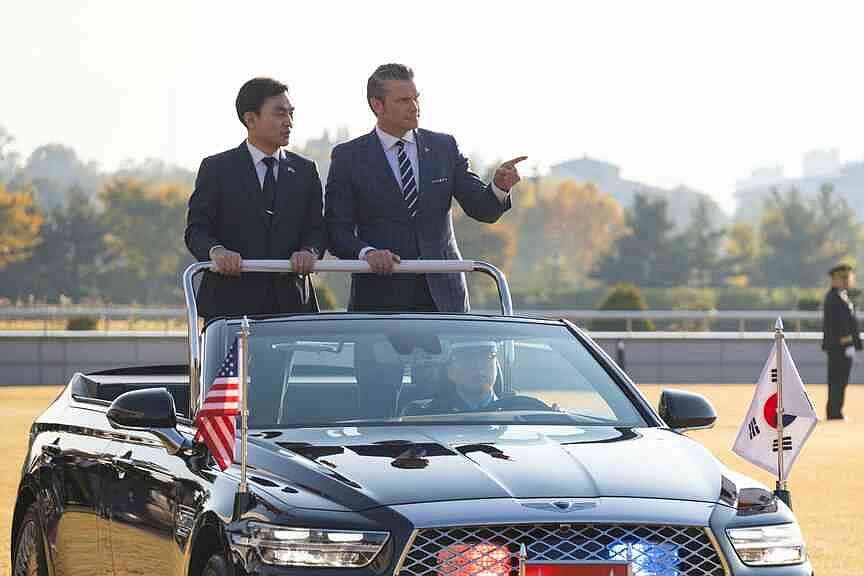Copyright Arkansas Online

SEOUL, South Korea -- U.S. Defense Secretary Pete Hegseth praised South Korea's plans to raise its military spending, saying Tuesday that the Asian ally will take a larger role in defending itself from North Korean aggressions as the allies must brace for "regional contingencies." Modernizing the decadeslong alliance between the U.S. and South Korea is a hot issue, as the U.S. apparently wants South Korea to increase its conventional defense capabilities so that Washington can focus more on China. After annual security talks with South Korean Defense Minister Ahn Gyu-back in Seoul, Hegseth told reporters that he was "greatly encouraged" by Seoul's commitment to increase defense spending and make greater investments in its own military capabilities. He said the two agreed the investments would bolster South Korea's ability to lead its conventional deterrence against North Korea. In a speech at parliament on Tuesday, South Korean President Lee Jae Myung asked lawmakers to approve an 8.2% increase in defense spending next year, which he said would help modernize the South Korean military's weapons systems and reduce its reliance on the United States. Hegseth highlighted defense cooperation on repairing and maintaining U.S. warships in South Korea, saying the activities harness South Korea's world-class shipbuilding capabilities and "ensure our most lethal capabilities remain ready to respond to any crisis." "We face, as we both acknowledge, a dangerous security environment, but our alliance is stronger than ever," Hegseth said. Hegseth said the South Korea-U.S. alliance is primarily aimed at coping with potential North Korean provocations, but must also keep other regional threats in view. "There's no doubt flexibility for regional contingencies is something we would take a look at, but we are focused on standing by our allies here and ensuring the threat of the DPRK is not a threat to the Republic of Korea and certainly continue to extend nuclear deterrence as we have before," he said. DPRK stands for the Democratic People's Republic of Korea -- North Korea's official name -- while Republic of Korea is South Korea's formal name. In recent years, the U.S. and South Korea have been discussing how to integrate U.S. nuclear weapons and South Korean conventional weapons in various contingencies. South Korea has no nuclear weapons and is under the U.S. "nuclear umbrella" security commitment. Ahn denied speculation that South Korea could eventually seek its own nuclear weapons program or is pushing for redeployment of U.S. tactical weapon weapons that were removed from South Korea in the 1990s. He stressed that Seoul remains committed to the nuclear non-proliferation treaty. "Because we cannot have nuclear weapons, a system integrating U.S. nuclear capabilities and South Korea's conventional weapons, the CNI (conventional-nuclear integration) framework, has been established," he said. Hegseth and Ahn did not issue a joint statement after the meeting, leaving the details of their agreements unclear. It's unusual for the two countries' defense ministerial talks to end without an immediate joint statement. But Hegseth said there was "no daylight or differences" between the two countries, only "a bigger deal which takes a little bit more time." During a separate meeting with Hegseth later Tuesday, Lee reiterated his support of an implementation of a previous agreement to transfer wartime operational control of the allied forces to a binational command led by a South Korean general. Currently, the commander of the 28,500 troops in South Korea has wartime operational control of the allied forces, including the South Korean military. Lee said South Korea taking greater defense responsibilities on the Korean Peninsula would lessen U.S. military burdens in the region, according to Lee's office. Many South Koreans view regaining their military's wartime operational control as a matter of national sovereignty. North Korea didn't immediately comment on the Hegseth-Ahn meeting. South Korea's Joint Chiefs of Staff said earlier Tuesday that it detected the North test-firing around 10 rounds of artillery toward its western waters on Monday, shortly before Hegseth arrived at an inter-Korean border village with Ahn to kick off his two-day visit to South Korea.



